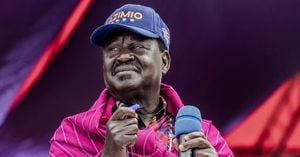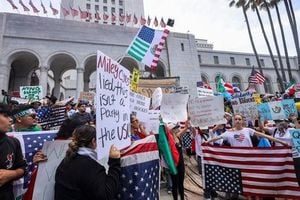Colombian President Gustavo Petro has ignited a fierce international debate after calling for a criminal investigation into former U.S. President Donald Trump and other American officials over a series of deadly military strikes on boats in the Caribbean earlier this month. The strikes, which the Trump administration claimed targeted drug traffickers, have left at least 17 people dead and have drawn sharp criticism from regional leaders, human rights groups, and legal experts alike.
Petro’s demand came during his address at the United Nations General Assembly on September 24, 2025, where he did not mince words about the U.S. military’s actions. “Criminal proceedings must be opened against those officials who are from the U.S., even if it includes the highest-ranking official who gave the order: President Trump,” Petro declared, as reported by SAN News and corroborated by several international outlets. He accused the U.S. of criminalizing poverty and migration, and of using lethal force unnecessarily against vulnerable populations.
The controversy stems from three separate U.S. strikes that occurred earlier in September. According to official accounts cited by BBC and other news agencies, the first attack happened on September 2, killing 11 people who had departed from Venezuela. A second strike, on September 16, resulted in three more deaths, and a third on September 19 claimed another three lives. U.S. intelligence briefed lawmakers that the first boat was fired upon after it changed direction and appeared to be heading back to shore, raising questions about the immediacy of the threat it posed.
While the Trump administration has maintained that the vessels were engaged in transporting illicit drugs and were linked to criminal organizations such as the Venezuelan Tren de Aragua gang, Petro flatly rejected these assertions. “They said that the missiles in the Caribbean were used to stop drug trafficking. That is a lie stated here in this very rostrum,” he said, referring to the U.N. platform. “Was it really necessary to bomb unarmed, poor young people in the Caribbean?”
Petro’s remarks were echoed by other leaders in the region. Venezuelan President Nicolás Maduro, who has long had a contentious relationship with Washington, announced that his government was preparing a series of constitutional decrees to defend national sovereignty against any future U.S. attacks. Maduro accused the Trump administration of using drug trafficking allegations as a pretext for military intervention aimed at toppling his government.
Petro, who restored diplomatic relations with Venezuela in 2022 after his election, emphasized that many of those killed were not hardened criminals but rather impoverished youths with few options. “If the vessels were carrying drugs as alleged by the U.S. government, their passengers were not drug traffickers; they were simply poor young people from Latin America who had no other option,” he insisted, as reported by Al Jazeera and other outlets.
Legal and human rights experts have also weighed in, expressing profound concern over the legality of the strikes. Several U.S. senators—both Democrats and some Republicans—have questioned whether Trump’s actions overstepped the bounds of executive authority, especially given the use of military force for what is traditionally a law enforcement matter. UN experts went even further, condemning the strikes as extrajudicial executions. According to Zamin, they argued that the use of lethal force was disproportionate and violated international law. “The boat could have been stopped and the people arrested, that is not killing,” Petro said, underscoring the point that non-lethal options were available and should have been pursued.
The Trump administration, for its part, has defended the strikes as necessary measures to stem the flow of narcotics from Latin America and the Caribbean into the United States. Trump described the operations as essential for national security, insisting that the targeted vessels were part of a broader network responsible for trafficking illegal substances. Dominican officials supported this narrative in part, stating that at least one of the boats was headed toward their country with the alleged intention of transporting narcotics to the U.S.
However, critics have pointed out significant gaps in the U.S. government’s account. The Trump administration has yet to provide detailed evidence on how it determined the boats’ cargo and the supposed gang affiliations of their passengers. Many observers, including members of Congress and international watchdogs, have called for greater transparency and a thorough investigation into the decision-making process that led to the use of lethal force.
The strikes also come against the backdrop of a major U.S. military buildup in the Caribbean, which Petro and others have described as a dangerous escalation. “The strengthening of U.S. military forces in the region is dangerous,” Petro warned, suggesting that such actions risk further destabilizing an already volatile area. This sentiment has found resonance among regional governments wary of external interference and among human rights groups concerned about the precedent set by military operations conducted without clear international oversight.
The repercussions of the strikes are already being felt in diplomatic circles. Petro’s call for criminal proceedings marks a rare and direct challenge to U.S. authority from a key Latin American ally. It also highlights the widening gulf between Washington’s stated objectives in the war on drugs and the perspectives of leaders and communities most affected by its policies.
For many in Latin America, the deaths have become a symbol of the broader consequences of militarized drug enforcement strategies. The question Petro posed at the U.N.—“Was it really necessary to bomb unarmed, poor young people in the Caribbean?”—has resonated far beyond Colombia’s borders, sparking renewed debate about the ethics and effectiveness of such approaches.
As calls for accountability grow louder, the international community now faces difficult questions about the line between security and sovereignty, and about the responsibilities of powerful nations when their actions have deadly consequences for the world’s most vulnerable. The coming weeks are likely to see intensified scrutiny of both the Trump administration’s policies and the broader framework governing the use of force in the name of combating transnational crime.
With emotions running high and facts still emerging, the world will be watching closely to see how the U.S. and its allies respond to one of the most contentious episodes in recent Caribbean history.





